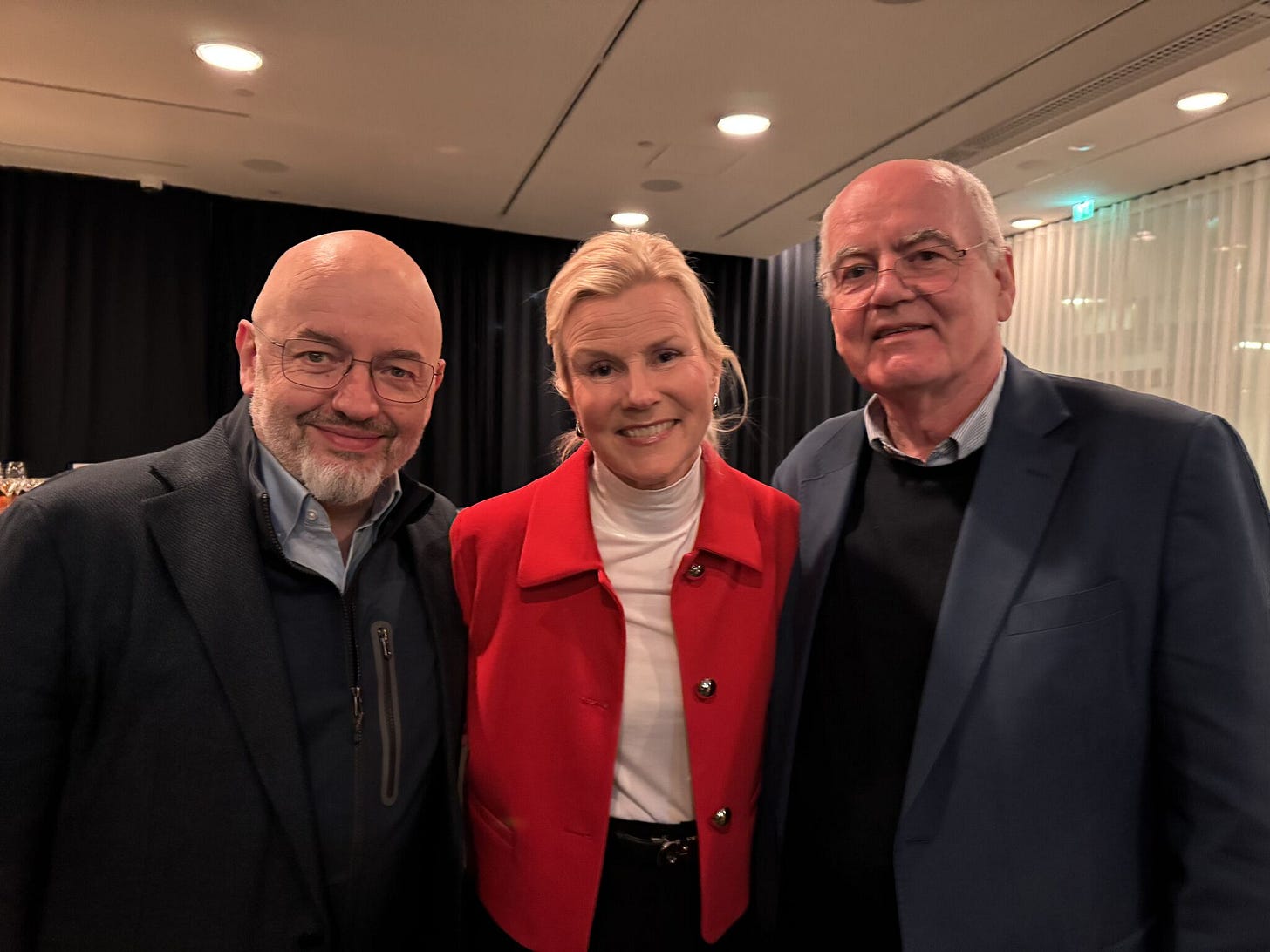Finland Takes Red Pill For Regeneration
Soft launch of new center for transformative sustainability and regenerative business
If you have ever watched the 1999 film The Matrix, you will almost certainly recall the moment where the main character, played by Keanu Reeves, is offered the choice between a red pill and a blue pill by rebel leader Morpheus. The rebel explains: "You take the blue pill... the story ends, you wake up in your bed and believe whatever you want to believe. You take the red pill... you stay in Wonderland, and I show you how deep the rabbit hole goes."
In the film, the red and blue pills symbolized an existential choice between learning an unsettling, life-changing truth by taking the red pill—or remaining in the unquestioned experience of ordinary reality with the blue pill. And it was a great privilege to be in Helsinki this week as Finnish business stressed their determination to keep taking the red pills.
FIBS takes red pill
As CEO of FIBS, which stands for Finnish Business In Society, Kimmo Lipponen recalled the red/blue pill dilemma at a conference celebrating the organization’s 25th anniversary. In a moment of crisis, where seismic shifts in geopolitics and macroeconomics are encouraging a profound rethinking of corporate social, environmental and governance goals, Kimmo stressed the need to keep the pressure building around the need for systemic change.
On 26th March, I was delighted to keynote the event hosted by FIBS, the largest corporate sustainability network in the Nordics. And I did so alongside Peter Bakker, CEO of the World Business Council for Sustainable Development (WBCSD), a key strategic partner for FIBS.
As it happened, both Peter and I stayed in newly refurbished apartments in the same building where the event was held, Finlandia Hall, designed by Alvar Aalto—and itself recently revamped.
Meanwhile, in the wider world, the pressures on business leaders are intense and growing, as FIBS itself explained:
Sustainable development and corporate responsibility have been the subject of unprecedented scrutiny throughout the first half of the year. The new US administration’s cut list has included, among other things, the Paris Agreement on climate change and diversity and inclusion programs. The EU is currently trying to ‘lighten’ the corporate responsibility directives that were agreed upon only a year ago and have already partially entered into force. Views that emphasize economic growth instead of longer-term sustainability have also risen in Finland.
New center for sustainable and regenerative business
Despite all this, FIBS concludes, “the long-repeated truth still holds true. The sustainable well-being of future generations requires that we secure the viability of the planet in this time.” And a key part of this strategy involves “the establishment of a new competence center for sustainable and regenerative business. The competence center will start operating in January 2026.”
The Center for Sustainable Transformation and Regenerative Business will start operating at the beginning of 2026. It will provide concrete support for companies' sustainability transitions and introduce them to regenerative thinking with concrete tools to guide them forward. As FIBS noted:
In practice, this means breaking our ways of operating and thinking that are based solely on continuous economic growth and moving towards regenerative thinking that ensures the conditions for life instead of destroying them. This requires significant changes but also brings new opportunities for value creation in every sector of society, from food and energy production to housing and transport.
According to Kimmo Lipponen:
We no longer have any options or time. The reckless destruction of nature, the accelerating warming of the climate, and the alarmingly steepening inequality of people in Finland as well as globally must be stopped. Simply reducing the harm will not do it. We know well enough that we cannot continually postpone the necessary changes to correct these problems, citing the struggling national economy, the geopolitical situation, and problems with international trade.
He went on to say: “Companies play a key role in sustainable change and regenerative thinking: a large-scale sustainability transformation can only be achieved if companies invest in sustainable practices as part of their operational strategy.”
Bigger than China
Both Peter Bakker and I agreed that what is going on in the United States now will be a massive distraction for some time to come, but we also see all of this as an extraordinary opportunity to disrupt ourselves. To take the whole sustainability sector to a different level. And with business involvement key, platforms like FIBS and WBCSD that help aggregate corporate activity can only become more important.
Where countries and regions manage to create acritical mass of more sustainable and regenerative businesses, the cost of capital will come down, as Peter put it. And we are now in a game of numbers. With some 250 members, he noted that WBCSD is now “bigger than China” in terms of total greenhouse emissions. Yes, some regions have been going slightly overboard on compliance, but—properly understood—sustainability is now about long-term competitiveness.
At a time when many sustainable business leaders are arguing that we must “stay the course,” Peter concluded, it’s time to “change our course.” The current “let me punch you in the face and then we do a deal” approach adopted by the Trump Administration is very likely to backfire, royally. So, as I put it in my session, we need to get our collective act together for the moment when the world wakes up and asks, “if not that, then what?”
While noting that the Matrix pill colors are back to front in terms of the colors allocated to major US political parties, even those who have opted take the blue pill are going to be forced to wake up at some point. The question is whether they will then double down on climate denial or begin to think about changing tack themselves.
As Peter put it, “Climate isn’t going to come to the negotiating table.” It is what it is—and it is going to do what it’s going to do, which will increasingly catch us all off-guard. Scandinavia may long have been something of an outlier on sustainability issues, but the sense at the FIBS event was that the future trajectory is now clear for both the region and for Finland in particular.
Expertise a key bottleneck
However, sustainability work must also be commercially viable, Kimmo stressed, “which requires not only an increase in the number of experts in the field but also strong support from the public sector and political decision-makers.”
Sustainability transformation also requires close cooperation between companies, the public sector and civil society actors. FIBS's new competence center will therefore bring together experts from different sectors, including the scientific community.
A key focus will be on developing and harnessing relevant expertise.
"One of the biggest bottlenecks in corporate sustainability work,” Kimmo warned, “is currently the shortage of experts in the green transition and sustainable business in general. Education and competence development in the field should be significantly increased. In addition, sufficient financial incentives supporting sustainable change, common rules of the game and predictable regulation guaranteeing a minimum level of sustainability are needed.”
Political stamina will also be essential, given that there will pushbacks, failures and casualties along the way. Both Peter and I mentioned Neste as a former star performer in sustainable business now fallen on harder times. As a former chair of their advisory council on sustainability and new markets, I have been particularly saddened by recent developments. But I left Helsinki with a strong sense that Finland is blazing a trail that many other countries will follow, eventually, even the post-Trump United States.
John Elkington is Founder & Global Ambassador at Volans. His personal website can be accessed here.
Available on Amazon and through good bookshops.










Growing GDP is false economic policy and the root cause of all problems.
I discovered that:
Promoting GWF 'general welfare' or sustainability, is true law that governs any human being in life and the fundamental law of US Constitution.
Therefor shifting from growing GDP to promoting GWF (sustainability) governing strategy globally, is the only solution to promote GWF of humanity and regenerate the nature.
Formula to save humanity:
GWF= Integral QT t x dt
Theory and practice how to make this transformation reality is in my book:
CHANGE GOVERNING SYSTEM.
Let's work together to make this paradigm shift reality.
I'm glad to hear that the WBCSD is still "in business" and even thriving. We need every newton of force we can get.
I also enjoyed the Finlandia Hall photos. I walked past it several times on my way to the Sibelius Park and sculpture. Fond memories of Finland!